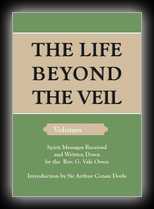
The Life Beyond the Veil Book 4 - The Battalions of Heaven
by Rev. George Vale Owen
1921
FROM THE PREFACE
THE messages recorded in this volume were all received and written down by the Rev. G. Vale Owen in the Vestry of All Hallows', Orford, Lancashire, after evensong. These thirty-four communications were first published in The Weekly Dispatch, and their termination on Sunday, September 26, 1920, brought to a conclusion an uninterrupted series which started in that journal on February 1, 1920. The first messages of this series commenced on September 23, 1913, and were from the vicar's mother and "Astriel"; they were followed by others at intervals, the communicators being "Zabdiel" and "Leader" and his band. These communications are contained in the first three volumes of this series, and in which I have given full details of how Mr. Vale Owen received the messages, together with data concerning the communicators, their methods, and matters relating to the personality of the one who received and recorded them. This present volume contains the communications from one who gave the name of "Arnel," for such was the name, disclosed to Mr. Vale Owen in the message dated February 5, 1918.
In the spring of 1921, and on an occasion when Mr. Vale Owen gave his first personal and public statement on the Script, he was asked the question as to how he was sure that the messages were not from his own mind, but from some source beyond it. As this question may arise in the minds of many who read these scripts for the first time, I think it will be helpful to give the vicar's answer as recorded at the time in the journal Light:
"He said it was a straight question, and deserved a straight answer. That was one of the things he KNEW. He was thinking of the great number of letters he had received, putting that question in various ways. It had been put to him many times, sometimes cynically, but now and then in a very different spirit. He did not think that many of those who asked it realized one simple fact that there was no one in the whole world whom the answer could affect so deeply as himself. He could assure his hearers that before consenting to make the messages public he had proved up to the hilt that they did not emanate from his own mind. He said to himself, I believe in a future life. My father, mother, and little child have passed into that life, and I am going there—it can only be a few years before I join them. Now, G. V. O., suppose you go over there and your mother says, 'I am so glad to have you here. But with regard to those messages, they did not come from us.' That would be hell to him, a hell that he could not face. The messages came from his mother and those on the Other Side. He made himself quite sure of it in more ways than one. He was certain, first of all, that they could not have come from his own subconscious mind, or if they did they must have been put there. Hewrote them at the rate of twenty-four words a minute on an average. That was not a quick speed if one knew what one was writing about, but he made it a rule not to think of the sittings beforehand. The people who came through were quite unknown to him, except his mother. When he had written, say, on Monday, on Tuesday he put the question, 'Is the writing correct?' More than once he had put the question, and had been stopped. Once his mother had communicated by the planchette (operated by his wife) in terrible trouble. He asked what was the matter, and she said, 'I am in great distress. You have done nothing; but the writing, that is the matter. For the last fortnight it has not come from us. Do not tear it up. It has been given for some purpose. It is not bad, but it is not from us. Wait a fortnight.' Later on she said, 'The way is clear now.'"
